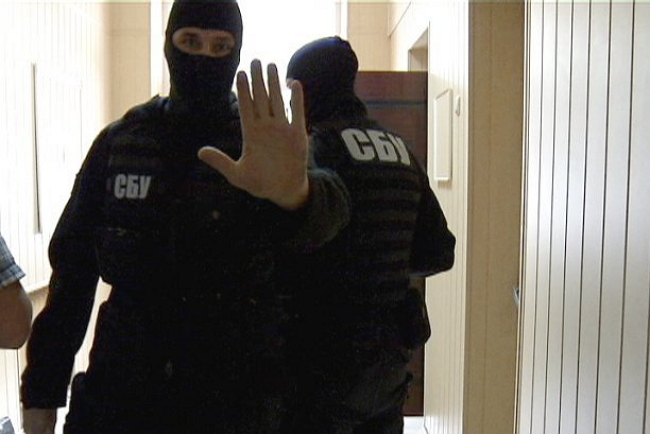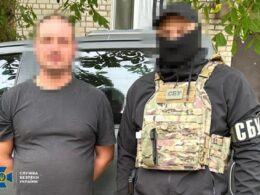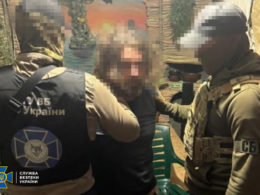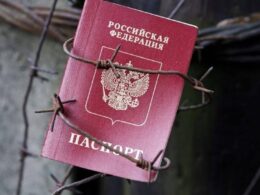The counterintelligence department of Ukraine's Security Service has detained a Russian collaborator in Sumy Oblast who helped occupiers to prepare a series of air assaults in the region, including strikes with guided aerial bombs.
In Sumy Oblast, the border with Russia spans over 560 kilometers. Official Ukrainian sources report dozens of Russian attacks targeting border communities in the region each day.
On 24 March, a Russian airstrike damaged 18 private houses in Seredyna-Buda city, five in Vorozhba city, and three in Yunakivka village, according to Armyinform. The next day, occupiers carried out an assault using guided aviation bombs on Bilopillya, damaging 20 houses and an education facility.
Moreover, according to Bild, Russian troops used a powerful thermobaric ODAB-1500 aviation bomb weighing 1500 kg to strike Velyka Pysarivka in Sumy Oblast for the first time. The invaders have used this volumetric-detonating bomb for the first since the Soviet Union, wrote Bild military analyst Julian Röpcke. The bomb, which releases a combustible liquid in aerosol form, igniting upon contact, resulting in a volumetric explosion, has also been used for the first time since the beginning of the all-out war in Ukraine, according to the New Voice of Ukraine
media outlet. The purpose of such munitions is the destruction of military personnel.
Following the strike, the analyst said a smoke cloud billowed to a height of 1 kilometer. Röpcke described the use of a 1.5-ton bomb in a civilian settlement as "a new low in Russia's war against Ukrainian cities."
Later, Ukraine’s Main Intelligence Directorate’s chief, Kyrylo Budanov, denied the reports by Bild, which said Russia used an ODAB-1500 bomb in Ukraine for the first time.
"I can directly refute this because an ODAB-1500 has been used more than once - both on the frontline and when the Russian Volunteer Corps and the Freedom of Russia Legion were in active operation (on the Russian territory). The ODAB -1500 was also used there. So this is nothing new,” he said during a national television broadcast on 31 March.
In 2023, the Ukrainian authorities announced that all residents of the 5-km zone in the Russian-bordering communities in Sumy Oblast would be evacuated. The head of the Regional State Administration, Volodymyr Artiukh, later explained that there would be no emergency or forced evacuation, adding that residents could refuse it. However, due to the intensified attacks, Ukraine decided to evacuate children from three communities forcibly from three settlements in the region.
Furthermore, more than other regions of Ukraine, Sumy Oblast suffers from the infiltration of Russian sabotage groups. Artem Semenikhin, the mayor of Konotopol, the city located nearly 89 km from Russia, says the primary objective of invaders is not merely conducting reconnaissance but rather orchestrating specific acts of sabotage - blowing cars and equipment or laying mines, 24tv
has reported. Ukrainian forces use unmanned aerial vehicles to monitor the situation along the border and detect sabotage groups. In addition, Russia expands its network of agents to spy on positions in Ukraine and conduct more strikes.
During the recent investigation, Ukraine's Security Service found that the enemy's primary objective included monitoring the defense positions within a 5-kilometer zone near the state border of Ukraine. The detained collaborator was supposed to track the locations of Ukrainian troops, mark coordinates on a map, and send a report to Russians to fulfill this task.
The agent attempted to identify strategic fortifications and determine the locations of Defense Forces units. The arrested woman, disguised as an ordinary citizen, conducted reconnaissance at the border and covertly recorded the objects chosen by Russians on her phone camera. The Security Service operatives documented the suspect's unlawful activities and apprehended her during a spy mission.
Simultaneously, Ukraine has taken comprehensive measures to ensure the safety of its forces' personnel, equipment, and ammunition in Sumy Oblast.
Russia's Federal Security Service recruited the agent following the commencement of the all-out war and after finding out her pro-Kremlin posts on social media.
At first, the collaborator was spying in the border area where she resided. However, after Russia shelled it, she and her neighbors were evacuated to another settlement in Sumy Oblast.
Upon arrival, she registered as a displaced person and intended, according to the FSB's instructions, to continue gathering intelligence about the Ukrainian forces.
During the search, authorities confiscated the mobile phones, which she utilized for communication with her Russian curator.
The Ukrainian investigators informed her of suspicion under Article 111 Part 2 of the Criminal Code of Ukraine (state treason committed during a state of war). The collaborator is currently in custody, facing the possibility of a lifetime sentence.
Earlier, Ukraine's military counterintelligence thwarted attempts by Russian military intelligence to infiltrate their agent into the headquarters of the Ukrainian Air Assault Forces, who turned out to be an employee of the Kyiv Regional Military Administration.
The agent sought to enlist in one of the combat brigades of the Ukrainian Air Assault Forces to spy on the locations of their deployment and movements toward the front lines.
Subsequently, the suspect was supposed to establish confidential relations with the command of the Air Assault Forces units.
In this way, he expected to expand his capabilities in gathering intelligence on weapons, operational plans, and military operations of Ukrainian defenders.
However, security service operatives timely exposed the "mole," identified his Russian curators, and documented his intelligence activities.
The next stage involved apprehending the collaborator while he was undergoing interviews at the headquarters of the Ukrainian Air Assault Forces Command to enlist into the ranks of the Armed Forces of Ukraine.
According to the investigation, the detained individual was the chief specialist of one of the departments of the Kyiv Regional Military Administration.
The official was remotely recruited by an officer of the 317th Intelligence Center of the General Staff of the Armed Forces of Russia, known as “GRU”.
In order to pose as a chaplain, a Kyiv resident fabricated a fake certificate, falsely asserting affiliation with parishioners of a specific denomination.
To achieve his objective, the Russian special services had been assigning him "trial" tasks even during his employment at the military administration. He maintained communication with the aggressor through an anonymous chat in a messenger application. During the arrest, the traitor's mobile phone was seized, containing evidence of his correspondence with the Russian GRU.
The special operation was conducted with the assistance of the Kyiv Regional Military Administration and under the procedural guidance of the Prosecutor General's office of Ukraine. The investigation is ongoing. The collaborator is facing a lifetime sentence.
Read also:
- Ukrainians might have hit Russia’s third A-50 radar plane, but ISW can’t confirm it yet
- Satellite imagery reveals how weak Kyiv city lights have become after Russia’s attacks on the electricity grid
- WP: US House Democrats probe SpaceX over Russia’s alleged use of Starlink in Ukraine
- CNN: Satellite safety at risk as Russia develops nuclear space weapon





